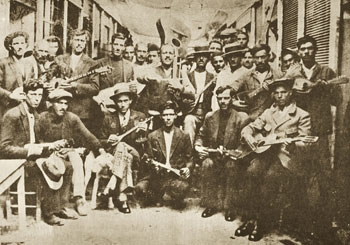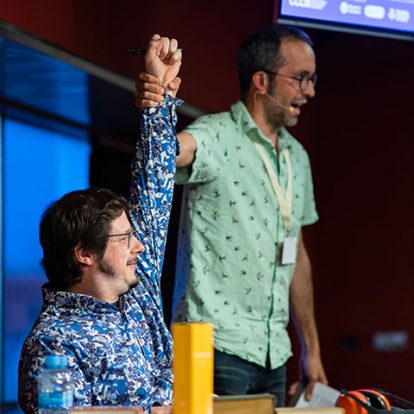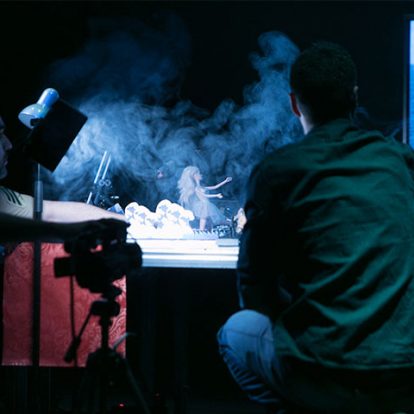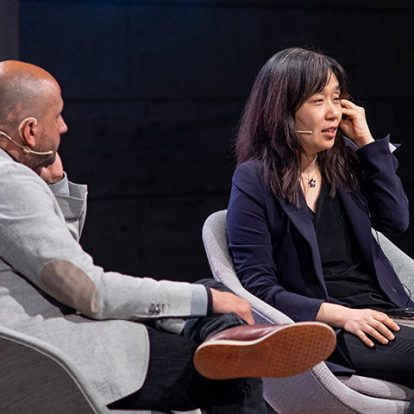Music and Literature for Transcending the Frontiers of Europe
Eva Rexach (K Team)
10 February 2015
The European Union has 24 official languages. If we count all the different dialects, regional languages, Latin, Esperanto and the languages of the communities of certain ethnic groups, such as Romani, then that number increases considerably. Europe, then, is one and it is many: its enormous cultural richness is due in large part to this mixture of languages, of oral and written traditions, but also of music, which is perhaps the most universal language of all.
Vinicio Capossela translates Europe through music. Specifically, through the rebetiko, a genre that illustrates extremely well the very history of the continent, a history of migrations, of peoples that merge, of languages that are transformed and of words that are shared.

Rebetes with bouzoukis in Piraeus, 1933.
The rebetiko has its origins on the southern coast of Asia Minor, in frontier territories between the East and the West, in ports such as that of Thessaloniki, in Greece, or Izmir, in Turkey, a city that is a mix of cultures in a country that is also a nexus between two continents. Its lyrics are inspired by the deeper depths, by disillusionment in love and melancholy. The rebetiko is like the tango, but with the bouzouki instead of the bandoneon concertina, and it is not sung in Lunfardo, but in a language that is a mixture of Turkish, Greek and Arabic and whose origin can be traced back no less than to the Koine Greek language that was spoken by Alexander the Great.
Sailors, traders and the common people spoke Rebetiko. And they sang it to a tough, struggle of a life. “It is an individualist kind of music for rebels without a revolution”, says Capossela, although this is not totally true: there was a revolution, that of 1922, in which Greece lost the war against Turkey. The music and the rebetiko were some of the few things they brought away with them.
Vinicio Capossela travelled to the Greece of the crisis. He toured its villages and talked with its people. He immersed himself in its stories, its songs and its culture. And from his experience, a record emerged, Rebetiko Gymnastas, which serves as a soundtrack for Tefteri, the travel book that has just been published by Minúscula. Tefteri: a word that, in Greek, serves to describe the accounts notebooks of small businesses. And in the hands of Capossela it becomes The Book of Accounts Pending.
Vinicio Capossela was born in Hannover, but his family is Italian. Valeria Bergalli, publisher at Minúscula, was born in Buenos Aires of an Argentinian father and an Italian mother, but she spent her teenage years in Berlin. Both will be at Kosmopolis 2015 to talk about emotional and musical language around the taverns of Athens, Thessaloniki and Crete. To talk about Europe and how to tell its story through tunes and words.
Beirut-Split-Berlin
Hoda Barakat is originally from Beirut, but has lived most of her life in Paris. And Alida Bremer is from Split, but her professional career means that she is very much linked to Germany. Both writers will also talk about Europe; in this case, through other lost stories: those of authors whose works are unknown or undertranslated. They will talk about Finnegan’s List.

The European Society of Authors logo
Finnegan’s List is, in reality, a project by the European Society of Authors that summarises a quote from Umberto Eco: the true language of Europe is translation, since it consists of producing a list of literary works that have been forgotten or undertranslated, based on the recommendations of a jury of European writers which changes each year. Bremer forms part of the 2015 jury, and Barakat was a member in 2012. Jordi Puntí, one of the most translated Catalan writers and a member of the jury this year, will also take part in this debate.
Since 2013, the list has joined forces with the Schwob project, which has the aim of promoting the modern classics of literatures in minority languages. We talked about Schwob at a round table in June 2014 which was called, precisely, Unknown Classics, and which was also attended by Minúscula, along with other independent European publishing companies. Schwob, you will have guessed, is a tribute to Marcel Schwob, creator of the Imaginary Lives that narrated the extraordinary (and fictitious) lives of Herostratus, Lucretius and Paolo Ucello, among others. Schwob, by the way, was also a polyglot and he spoke Sanskrit.
However, we were in Germany, in the place where Capossela, Bergalli and Bremer all converge. And German is the language chosen by Marjana Gaponenko (Odessa) and Abbas Khider (Baghdad). Both have won the Adelbert von Chamisso Prize, an award that has been made since 1985 by the Robert Bosch Foundation to promote the work of authors writing in German whose mother tongue is not German. Chamisso himself, by the way, did not speak just one language: of French origin, his family had to flee when the Revolution broke out. And guess where? To Germany of course.
Marjana Gaponenko and Abbas Khider will also participate in Kosmopolis 2015 at a round table organized by the Goethe Institut regarding the experience of writing in the language of his host country. The Ukraine lies over 1,700 kilometres from Germany; Iraq over 4,400; and Spain is a not inconsiderable 2,300 kilometres away. These are very long distances that, however, these three writers have shortened between them through a common nexus: the German language.
Incidentally: in 1983, Costas Ferris directed a film called Rembetiko, which was enormously successful and for a short period of time made this music very fashionable. That same year, he won a prize: the Golden Bear. And guess who awards that prize? The Film Festival of Berlin, in Germany.









